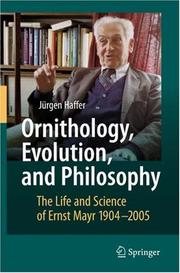| Listing 1 - 3 of 3 |
Sort by
|
Book
ISBN: 0199813701 1282917773 9786612917776 0199813345 9780199813346 9780195387346 0195387341 9781282917774 Year: 2010 Publisher: Oxford ; New York : Oxford University Press,
Abstract | Keywords | Export | Availability | Bookmark
 Loading...
Loading...Choose an application
- Reference Manager
- EndNote
- RefWorks (Direct export to RefWorks)
Haldane, Mayr, and Beanbag Genetics presents a summary of the classic exchange between two great biologists - J.B.S. Haldane and Ernst Mayr - regarding the value of the contributions of the mathematical school represented by J.B.S. Haldane, R.A. Fisher and S. Wright to the theory of evolution. Their pioneering contributions from 1918 to the 1960s dominated and shaped the field of population genetics, unique in the annals of science. In 1959, Mayr questioned what he regarded as the beanbag genetic approach of these pioneers to evolutionary theory, ""an input or output of genes, as the adding of
Evolutionary genetics --- Population genetics --- Genetics --- Heredity --- Genetic evolution --- Evolution (Biology) --- History. --- Haldane, J. B. S. --- Mayr, Ernst, --- Kholden, Dzh. B. S., --- Kholdeĭn, Dzhon Bėrdon Sanderson, --- Haldane, John Burdon Sanderson, --- Maĭr, Ė., --- Evolution. --- Genetics, Population --- History, 20th Century.

ISBN: 1281066389 9786611066383 354071779X 3540717773 3540717781 Year: 2007 Publisher: Berlin, Heidelberg : Springer Berlin Heidelberg : Imprint: Springer,
Abstract | Keywords | Export | Availability | Bookmark
 Loading...
Loading...Choose an application
- Reference Manager
- EndNote
- RefWorks (Direct export to RefWorks)
This book is the first detailed biography of Ernst Mayr. He was an ‘architect’ of the Synthetic Theory of Evolution, and the greatest evolutionary biologist since Charles Darwin, influential historian and philosopher of biology, outstanding taxonomist and ornithologist, and naturalist. He is one of the most widely known biologists of the 20th century. Mayr used the theories of natural selection and population thinking as theoretical models within the framework of historical biological studies. He suggested that various competing paradigms may exist side by side and more or less pronounced ’revolutions’ may occur in different fields from time to time. Changes of concepts have a much stronger effect on the development of biological sciences than the discovery of new facts. Mayr was the first to emphasize the role of biopopulations, thereby pointing out the basic difference between ’population thinking’ and typological essentialism. Population thinking takes into consideration the uniqueness of each individual and unlimited variation of populations which may lead to the development of new species. On the other hand, typologists assume that the unchanging essence of each species determines variation and fixed limits of variation preclude speciation from occurring except through saltation. Jürgen Haffer majored in geology and paleontology obtaining a PhD degree at the University of Göttingen. He became an exploration geologist and lived in South and North America, Iran, Egypt, and Norway. During these assignments he studied the bird faunas of Amazonia and Iran and has been in close communication with Ernst Mayr. He also co-published a biography of Erwin Stresemann, Mayr’s teacher and friend in Berlin, Germany.
Naturalists --- Ornithologists --- Mayr, Ernst, --- Scientists --- Zoologists --- Maĭr, Ė., --- Evolution (Biology). --- Life sciences. --- Zoology. --- Animal ecology. --- History. --- Evolutionary Biology. --- Life Sciences, general. --- Animal Ecology. --- History of Science. --- Animals --- Zoology --- Ecology --- Biology --- Natural history --- Biosciences --- Sciences, Life --- Science --- Animal evolution --- Biological evolution --- Darwinism --- Evolutionary biology --- Evolutionary science --- Origin of species --- Evolution --- Biological fitness --- Homoplasy --- Natural selection --- Phylogeny --- Annals --- Auxiliary sciences of history --- Evolutionary biology.

ISBN: 9783540717775 9783540717799 9783540717782 Year: 2008 Publisher: Berlin Springer
Abstract | Keywords | Export | Availability | Bookmark
 Loading...
Loading...Choose an application
- Reference Manager
- EndNote
- RefWorks (Direct export to RefWorks)
This book is the first detailed biography of Ernst Mayr. He was an architect' of the Synthetic Theory of Evolution, and the greatest evolutionary biologist since Charles Darwin, influential historian and philosopher of biology, outstanding taxonomist and ornithologist, and naturalist. He is one of the most widely known biologists of the 20th century. Mayr used the theories of natural selection and population thinking as theoretical models within the framework of historical biological studies. He suggested that various competing paradigms may exist side by side and more or less pronounced 'revolutions' may occur in different fields from time to time. Changes of concepts have a much stronger effect on the development of biological sciences than the discovery of new facts. Mayr was the first to emphasize the role of biopopulations, thereby pointing out the basic difference between 'population thinking' and typological essentialism. Population thinking takes into consideration the uniqueness of each individual and unlimited variation of populations which may lead to the development of new species. On the other hand, typologists assume that the unchanging essence of each species determines variation and fixed limits of variation preclude speciation from occurring except through saltation. Jürgen Haffer majored in geology and paleontology obtaining a PhD degree at the University of Göttingen. He became an exploration geologist and lived in South and North America, Iran, Egypt, and Norway. During these assignments he studied the bird faunas of Amazonia and Iran and has been in close communication with Ernst Mayr. He also co-published a biography of Erwin Stresemann, Mayr's teacher and friend in Berlin, Germany.
Evolution (Biology) --- Naturalists --- Ornithologists --- Philosophy --- History. --- Mayr, Ernst, --- Scientists --- Zoologists --- Historians, Natural --- Natural historians --- Animal evolution --- Animals --- Biological evolution --- Darwinism --- Evolutionary biology --- Evolutionary science --- Origin of species --- Biology --- Evolution --- Biological fitness --- Homoplasy --- Natural selection --- Phylogeny --- Philosophy&delete& --- History --- Maĭr, Ė.,
| Listing 1 - 3 of 3 |
Sort by
|

 Search
Search Feedback
Feedback About
About Help
Help News
News